GOLF
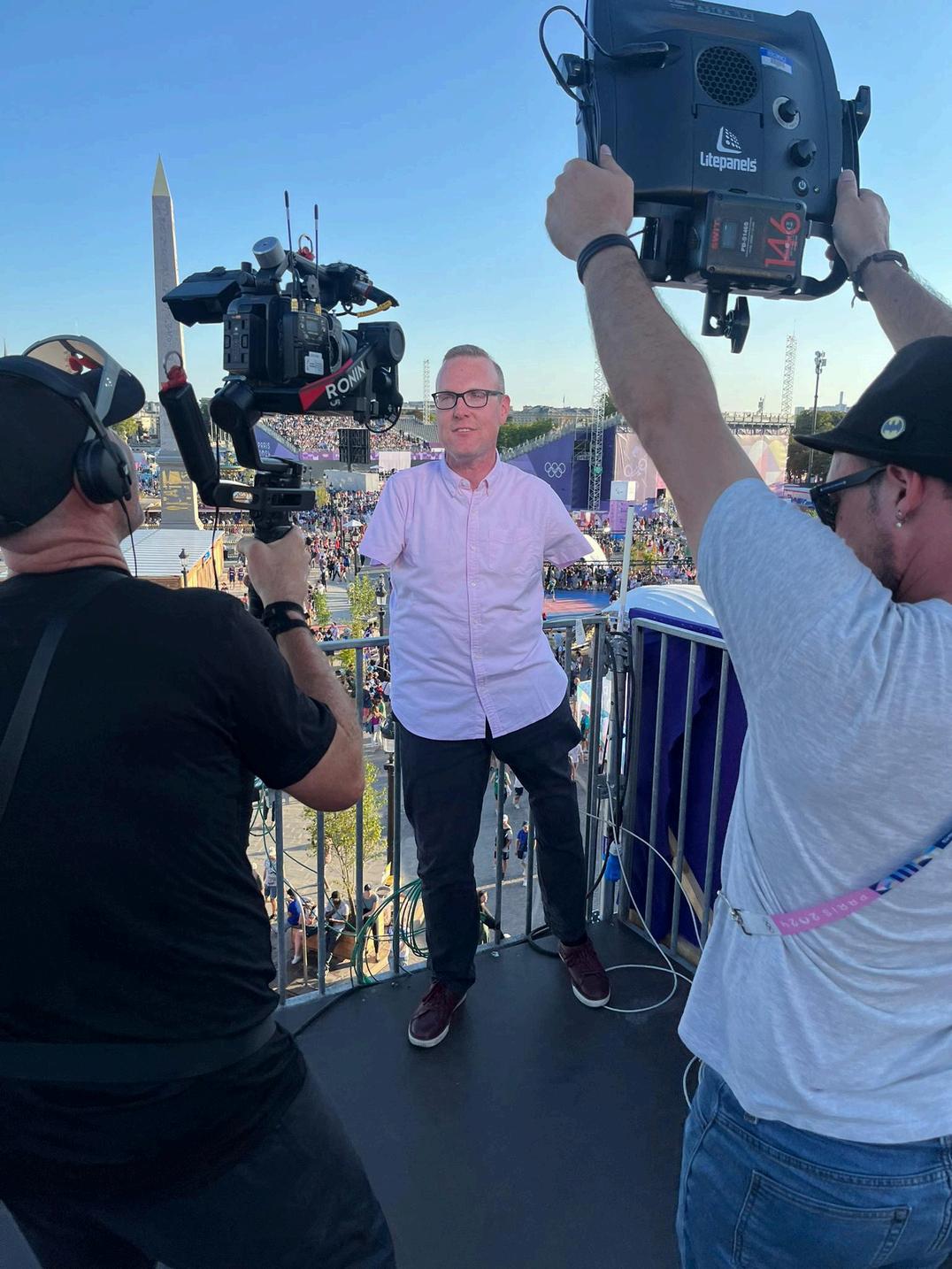


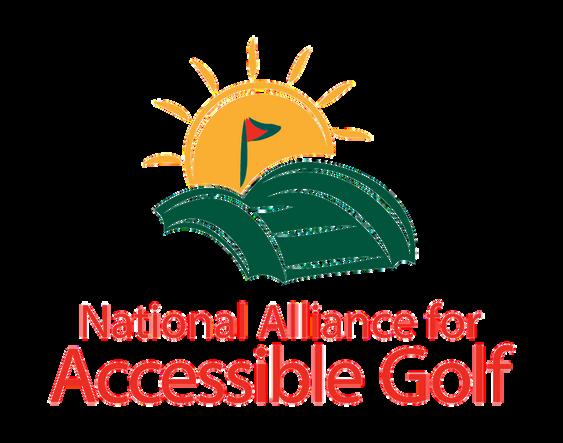
Executive Director, Dave Barton, PGA
The Alliance is a leader in access and inclusion - increasing the participation of people with disabilities in the game of golf.
An interview with international sports presenter Andy Stevenson
Golf course superintendents play a crucial role in ensuring facilities are accessible to individuals who require additional access.
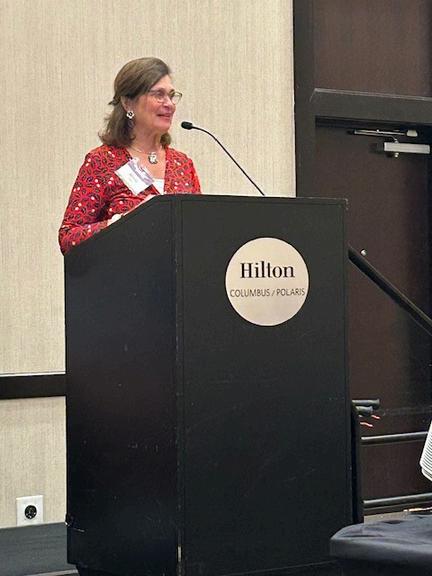

A networking platform and resource center for golfers, adaptive golf leaders, and anyone who believes golf is a game for everyone.
How do you know your golf course is accessible per the Americans with Disabilities Act? Simple…make some time to find out.
Mindy Derr, Columbus, Ohio, shares her 36 plus years of golf therapy success
Alliance Executive Director, Dave Barton recently had the opportunity to sit down with NGCOA Senior Director of Advocacy Ronnie Miles and Golf Business Advocacy Angle host Michael Williams to talk golf.

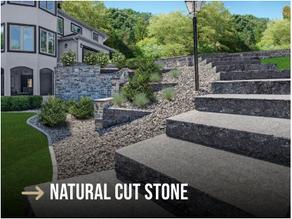
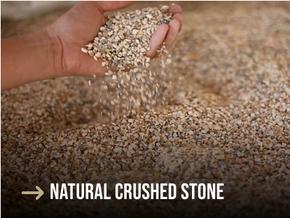
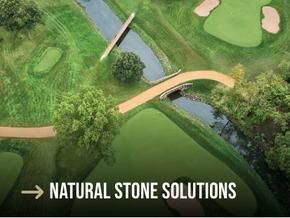
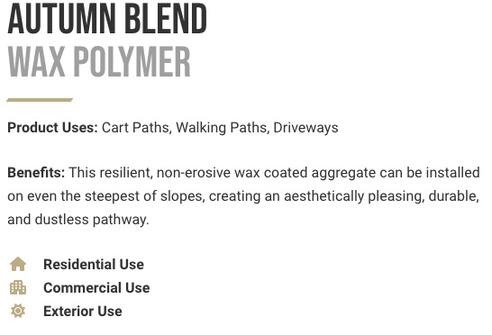
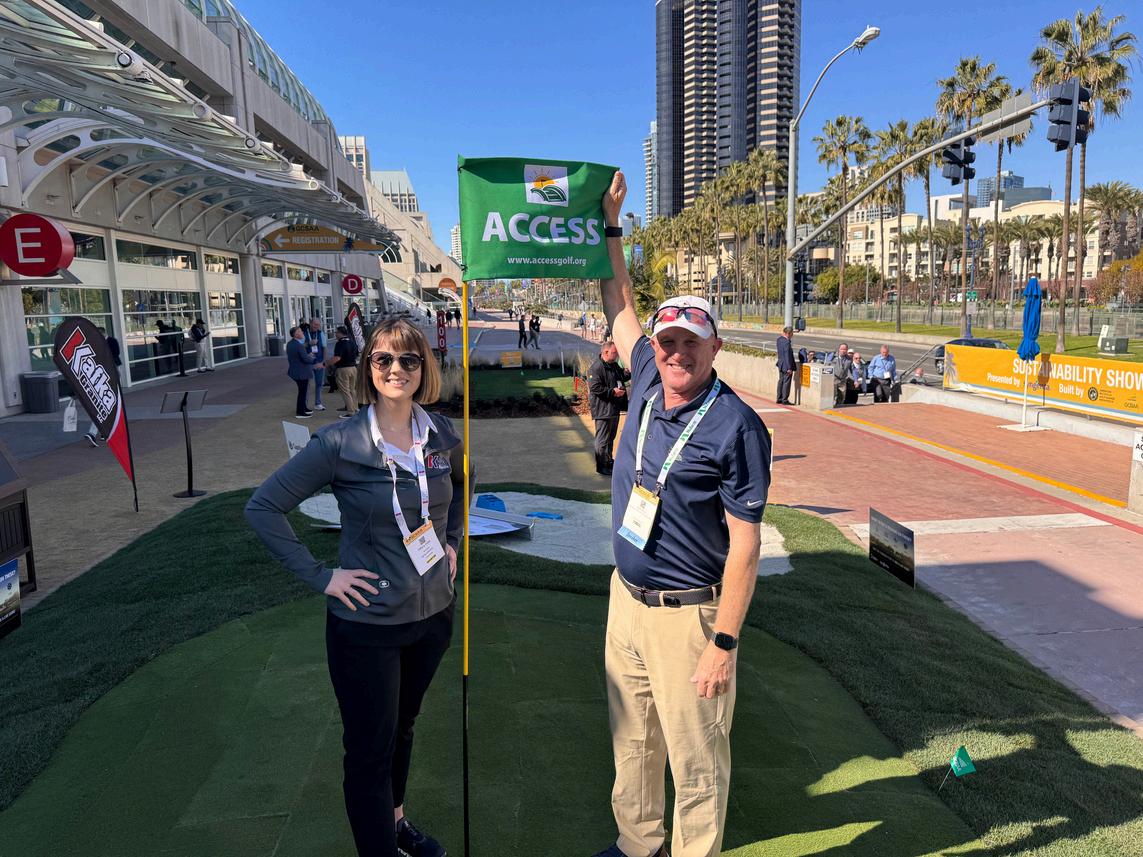
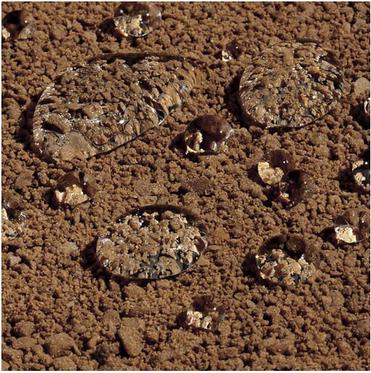
“Kafka’s support of our mission makes it possible for us to deliver education to the golf industry We are proud to be associated with them and the commitment they have to delivering products that improve accessibility to golf facilities around the country!”
Dave Barton, PGA, Executive Director, National Alliance
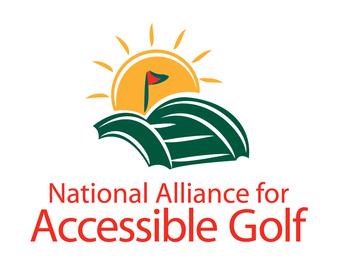
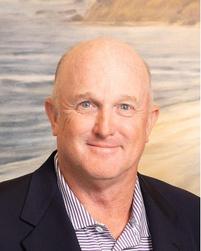
Dave Barton, PGA Executive Director
School is back in session and well, for those who work out of the house and still have school-aged kids at home, did you get that weekday round of golf in yet? �� It is hard to believe that fall is upon us and, here in Charleson, the hurricane season lottery has begun
Our Inclusion Influencer for September is Andy Stevenson, who has rapidly become “the face of adaptive golf” His perspectives on golf and sport in general are a must listen!
Learn about Mindy Derr who, for over 36 years has been a leading advocate and program leader connecting health and wellness therapeutic programming to the game of golf.
There more, including a chat I had with the National Golf Course Owners Association to talk about our shared efforts related to access on the NGCOA Advocacy Angle Podcast.
Do you have a story to share about a golfer, program or coach? Just drop us a note at info@accessgolf.org as we welcome any opportunities to share stories that help others see what is possible

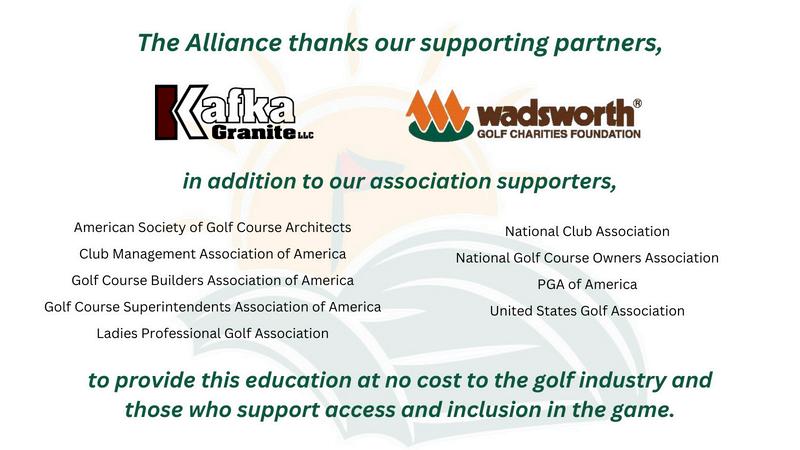

Our mission is to increase the participation of people with disabilities in the game of golf
The National Alliance for Accessible Golf (National Alliance) is the leader in inclusion working to ensure the opportunity for all individuals with disabilities to play and participate in the game of golf Formed in the summer of 2001, the National Alliance is represented by professional associations within the industries of golf, recreation and leisure, and health care providers as well as organizations that advocate for inclusion and provide services to individuals with disabilities
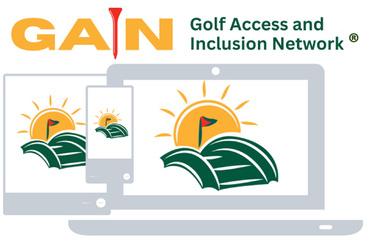
In addition to advocating for individuals with disabilities in print and online publications as well as social media marketing and interviews, the National Alliance engages in speaking opportunities at conferences and other public events. The Alliance also hosts GAIN, an adaptive golf community networking and engagement forum
The Alliance Education Hub provides guidance to golf course owners and operators seeking ways to make their golf courses and facilities more welcoming, accessible, and inclusive to golfers with disabilities, including programs to bring new golfers into the game.
The Alliance delivers resources including ADA guidance, policy templates and more to create accessible, inclusive, and welcoming environments.

Excerpts from Alliance Executive Director Dave Barton's interview with International Sports Presenter
Andy Stevenson
A kids perspective... “ …I was born like that but, growing up as a kid, you know, I wanted to run around and play sports as much as anyone else … even just playing soccer in the garden with my dad, or my mates down in the park I kind of got to a point in my teenage years where I realized that I could play these sports for fun, but I probably wouldn't become, you know, a Premier League or England international soccer player. ”
Early career foundations... “ at school and through university, I was always a words person I was much better with letters and words than I was with numbers. I was always quite a good writer. Journalism then became the thing I focused on. So, yeah, from a pretty early age, I'd say maybe 12, 13, 14 years of age I wanted to be a sports reporter in newspapers ”
Being called the “Face of the Adaptive Open” ... “I know people aren't seeing this video, but you can see that I'm probably blushing a bit, because I feel almost a bit embarrassed by that. I hadn't really considered it that way, but I must admit, when I go to the US Adaptive Open, I’m welcomed so warmly and, you know, treated so nicely by everyone there
Interestingly, last summer when I did the Adaptive Open in Kansas and then a week later I worked at the Open Championship, at Royal Troon, some of the American players who I interviewed for my job at Troon for BBC Radio started or broke the ice by
saying, you know, forgive my accent, but kind of like, hey man, I saw you on the Adaptive last week on the Golf Channel, and it was yet another example to me of, wow, this is big out there ”
The value of exposure... “You know, I think also, you ask if I ever would have anticipated being the face of adaptive golf I suppose when I started out doing this, I wouldn't have even been aware of adaptive golf, full stop, you know, let alone television coverage of it. I would have known, of course, that there would be disabled people out there playing golf but, I think I'd be right in saying, you know, 20 years ago, I don't think there was any kind of formal tour or championships, maybe at a local level, but certainly not, you know, international. ”
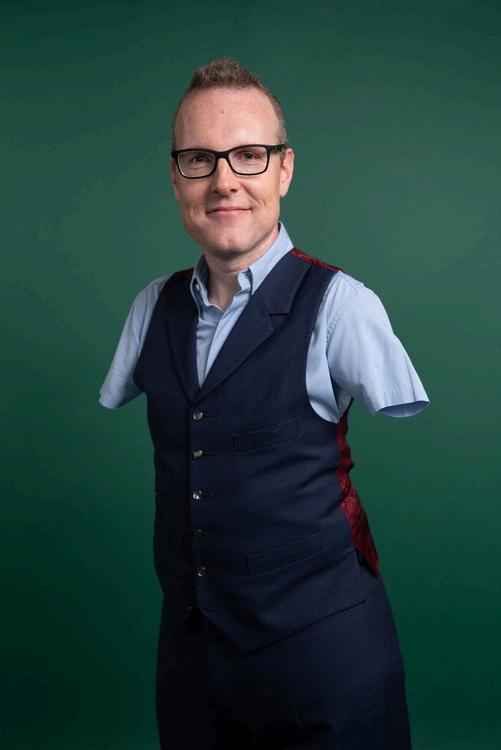
Par 3s and putting for my Dad... “I think actually one of the important things when I look back to how I started playing was par-3 length courses, or pitch and putts We would go on a family holiday, we'd of course spend time at a beach and in town, and then there'd be a pitch and putt, and so dad and my uncles would want to play. My dad would want to be able to take me along, so what I do remember is I started off by doing some of his putts for him.
My dad probably sort of, you know, gave me a putter, can you hold this, son, type thing, and I must have figured out a way to hold it, and started doing some of his putts My joke at this point is that my dad was a terrible putter, so he was always probably quite happy to give me the putter and let me do his putts for him. ”
My first club... “I got to, let's say, 13, 14 years of age, my dad spoke to a guy, the club pro, at a local golf club, and must have told him about me, and the next thing I know, I'm going in to meet this guy, and this guy has welded a couple of shafts together to give me my first 7-iron. ”
Inclusion... “So now I've got 3 clubs and my dad would take me every Saturday morning for lessons Lessons, like, just a group lesson with other kids The pro who'd made me my club's an amazing guy called Terry Gosden … it snowballs into playing with my friends .. and playing with dad pretty regularly. ”
Seeing is believing... “For any person with a disability out there, whether you've been born with that disability, or whether you've acquired it in an accident, or illness, or whatever's happened to you, to see people a bit like yourself playing golf...it's fascinating for me watching Andreas Brandenberger and Brandon Canesi. To see those guys and see how they play, and then see people with disabilities that are different but similar to me This is how I've come up with this idea to try and work with PING, or whoever wants to help me ”
My golf swing... “Can I swing with just one arm? Because at the moment, I hold the club sort of under one arm, up through my chin and shoulder on the other side My head is essentially connected to the club, almost It's certainly involved in my swing, which means I can only swing back to, let's say, 3 o'clock over here, swing through to, kind of 9 o'clock over there. If I was freed up, you know, if my torso and my head were freed up and I am just swinging with my right arm attached to the club obviously, there'll be difficulties associated with that, but if I can get some whip on that club, I think I will get more power, more distance, potentially be just more comfortable playing. ”
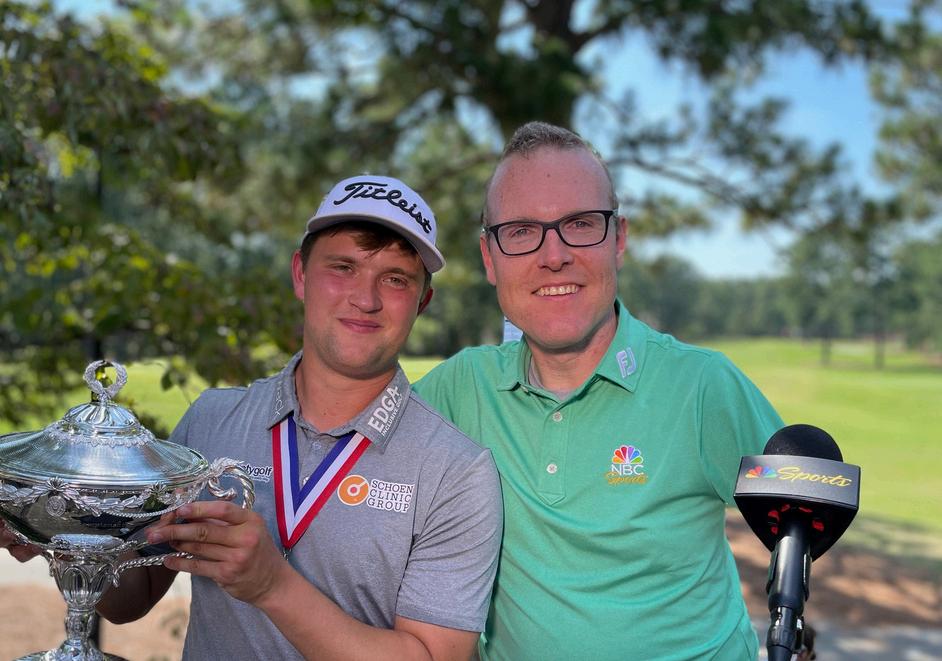
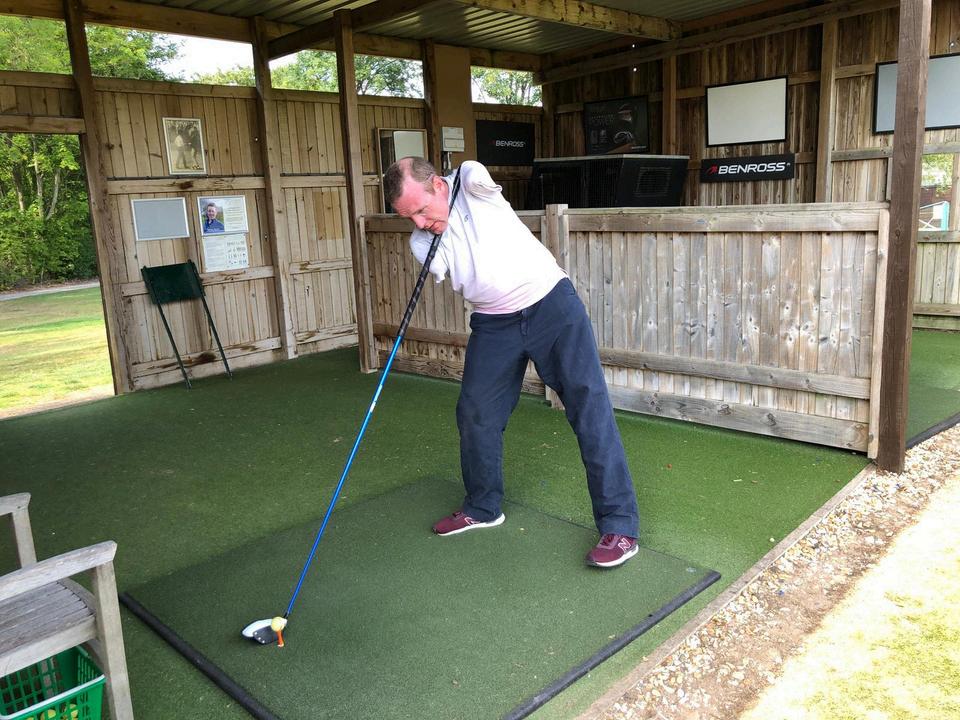
Interviews with players... “Me having a disability myself does help me in that regard, because I think I can put people at ease, players at ease, that I'm not going to embarrass them or anything I am gonna ask them about their disability. I am gonna ask them to explain how it affects their golf and hopefully they understand that I'm not being, I'm not trying to be offensive, or cheeky, or as I say, embarrass them in any way
I'm trying to get it across to the person at home, to make the person at home go, wow, just as much about them
as they will for Andreas, or Max, you know, playing from his wheelchair, or any of the players who have that obvious visible disability So, I do think that is one of the things I bring to the coverage, which is I'm not frightened of asking the players things. But, also I'm kind of conscious of and sensitive enough to maybe tee it up with them first, you know, I'll often say to them offcamera ‘By the way, are you happy if I ask about X, Y, or Z?’ Because if they're not happy, I won't ask, that's a red line ”
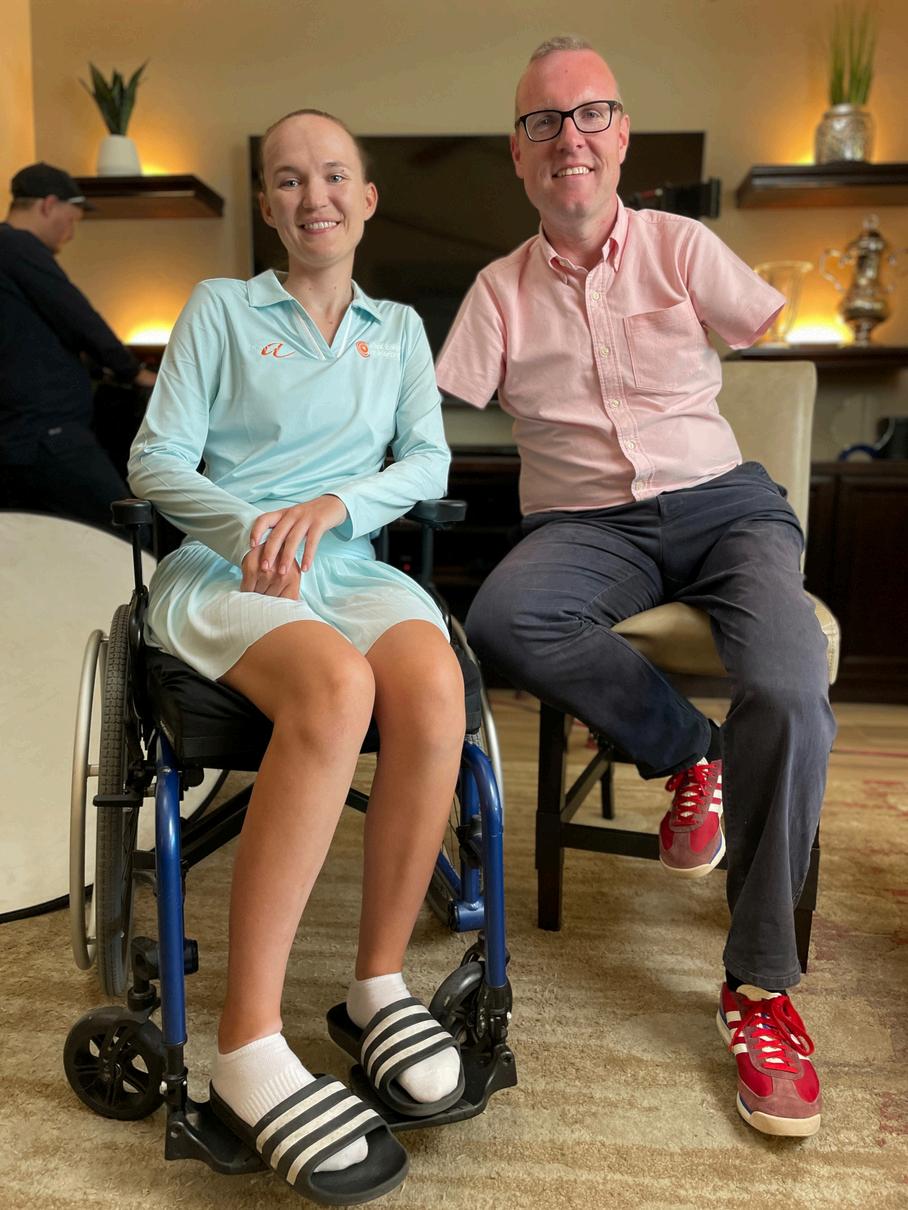
Access and accommodations... "In everyday life, obviously, there are occasional access situations I think the classic one, I guess, to a certain extent, everywhere, but certainly in this country, would be public transport Are there elevators? Are there trains coming up on a level platform to step onto?
On a golf front, I would like to think that things like the Adaptive Open and the Golf Channel coverage, things like the G4D Open and the coverage the RNA gives to that in this country are kind of bleeding down to golf clubs everywhere, so that when a disabled person turns up and says, can I use a buggy, can I go out and play 6 holes rather than 18 and obviously not be charged for 18. Can I bring somebody with me who's actually not gonna play golf, but they're gonna walk around with me and put the tee down for me and pick the ball out of the hole, you know, tend the flag?
I hope that the answer to these questions is yes, and I hope that the coverage of the tournaments is actually sort of helping the answer be yes, if you know what I mean ”
Rules versus being reasonable... “Standards and etiquette, and things like that Now, all of these things are crucial, don't get me wrong but, I think in some cases they can hold the sport back when it comes to the world of accessibility. Maybe sort of silly examples here, but I think they illustrate the point. If a disabled person comes along and says, look, my disability or my condition means that I've got to wear shorts, or I've got to wear a hoodie, or I've got to take my buggy onto the tee, or near the green, or whatever I would hope that common sense comes into play here and the golf club goes ‘Okay, yes. ’
Or, Can I play 6 holes, have a break go out and play another 6 holes, have a break, and play another 6 holes across a day, or 2 days, or whatever? I suppose I still am a bit concerned that at some of the stricter golf clubs about the place it would be, ‘Oh, no, no, you can't do that, that's against the rules. ’ Obviously, you guys and lots of other organizations, you know, your work is partly in this area to make golf clubs more accommodating to unusual requests but they're requests being made for a very good reason ”
Is this a legal issue at the core... “It shouldn't be down to a law, should it? Do you know what I mean? The law is there as the backstop, but actually the golf clubs should be willing to help and compromise and do some of these things, just because they should You know, it's the right thing to do They should be proactively trying to help disabled people get into golf, or enjoy golf. That's the bottom line, isn't it?”
Guidance for interested young broadcasters... “I suppose, being realistic, you probably do have to be interested in writing, for a start, because, you know, people might look at me and go, well, you're on the radio, you're talking, but of course, I'm writing what I'm talking, not necessarily word for word, maybe just bullet points. You have to be good with words, whether written or spoken I think that's the thing
I think my key advice would be watch and listen to and read as much sports media as you can, and identify the people that you like watching and reading and listening to … and not try to copy them, but work out what it is that you like about them Then, sort of try and bring it into your own style You have to be yourself I mean, you really, really have to be yourself You can't just go on and pretend to be Jim Nance I think this is one of the big things, you know, you see it at the Masters a lot, you see the clip of the winning putt, and he doesn't speak for several seconds. You know, he knows when not to talk That is the thing maybe you take from Jim Nance and go, okay, I'm gonna remember not to do that ”
Byproducts of your journey... “I suppose increasingly now, the feeling that again, not me personally, necessarily, but kind of we collectively involved in something like the Adaptive Open, for example, are beginning to make a difference. You know, the coverage is increasing year on year. The awareness of adaptive golf around the world is increasing … and as I say, that's not down to me personally, but it's down to the thing I'm involved in, and a whole wide range of people working towards it You know, that feeling that does make me feel proud … I think when I look back at 12-year-old me doing my dad's putting for him at a pitch and putt, and now, here I am, or however many years later, 32 years later, I'm presenting disabled golf tournaments in different places around the world ”
The Grind... “I'm guilty, I don't know if you're like this, Dave, but I'm guilty of, sort of, one thing ends, and I'm then immediately on to, right, okay, what are we doing next week? Absolutely not in a kind of not caring way, just in a kind of, right, I've got to make sure I do a good job at the next thing I do, or the next thing I do What's next? And I don't give myself enough time
You know, interviews like this are actually an opportunity to sit and reflect and go, OK, actually, yeah, I should take a minute to, sort of, just digest that I've done 3 Adaptive Opens now, and hopefully do many more, and as I say, we're making a bit of a difference So, yeah, it's the exciting travel, the great people I get to meet, and the great things I get to see, and then

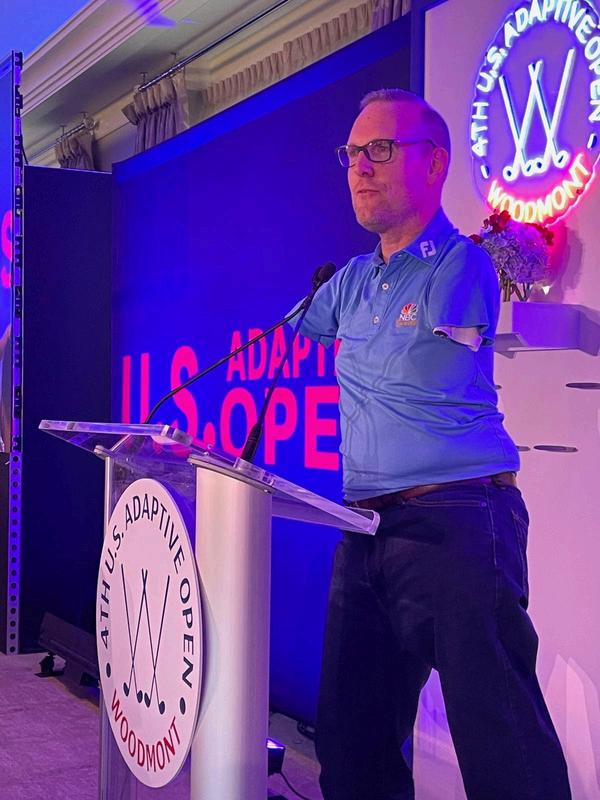
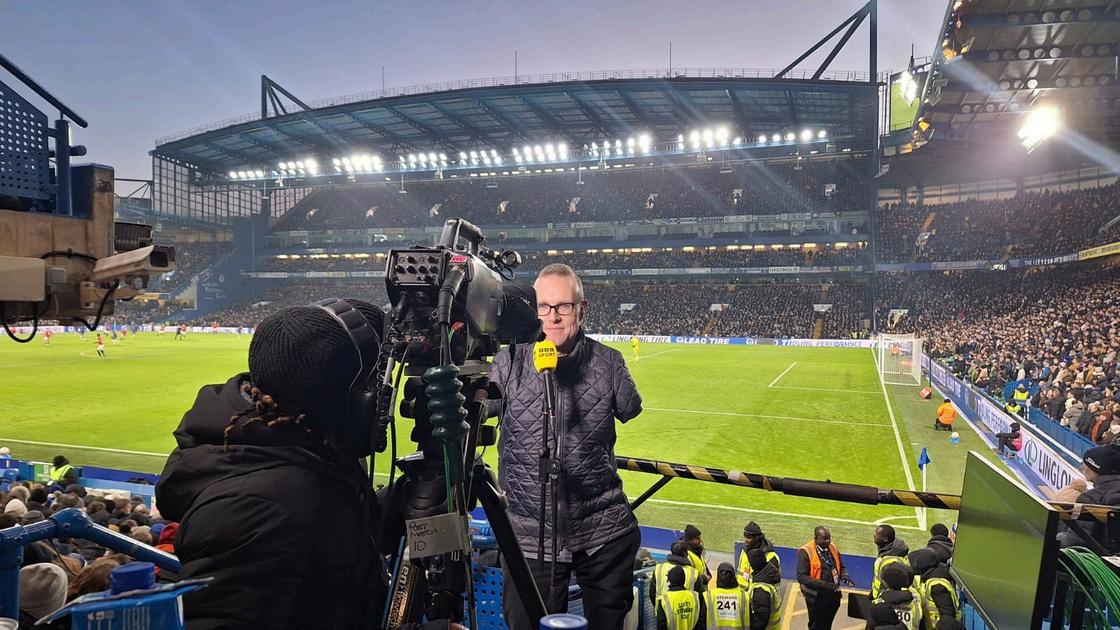
By Dave Barton, PGA | Published on gcmonline
Golf course superintendents play a crucial role in ensuring facilities are accessible to individuals who require additional access.
I’m often asked, what organizations or individuals comprise the National Alliance for Accessible Golf? What makes us an “alliance”? We’re not an association, and we don’t collect dues from individuals or organizations My answer? If you believe golf is a game for all, then you are a welcomed part of the Alliance.
The National Alliance is an assembly of like-minded individuals and organizations that recognize the continuing need to advocate for individuals with disabilities to bring them into the game Along with advocacy, the Alliance delivers the resources and education golf facility owners and operators require to understand the Americans with Disabilities Act, their responsibility to deliver accessible and inclusive environments, and actions to take to do so
.com | September, 2025
The Alliance evolved out of several working groups in the mid-1990s involving representatives from academia, the golf industry, health care and more as it became apparent the ADA addressed “buildings” but did not yet address equitable access to the golf course itself. An outcome of these working groups was the creation of the National Alliance for Accessible Golf in 2001 to serve as the golf industry education and resource center related to the ADA
Equitable access includes providing a barrier-free physical environment, permitting golfers with a disability to access areas of the golf course as easily as any golfer may These areas include practice areas, teeing grounds, greens and accessible routing throughout the course, notwithstanding publicly accessible areas of the clubhouse, such as the pro shop, locker room, dining room and more.
There is a history of GCSAA involvement related to the ADA and golf Present at these early working

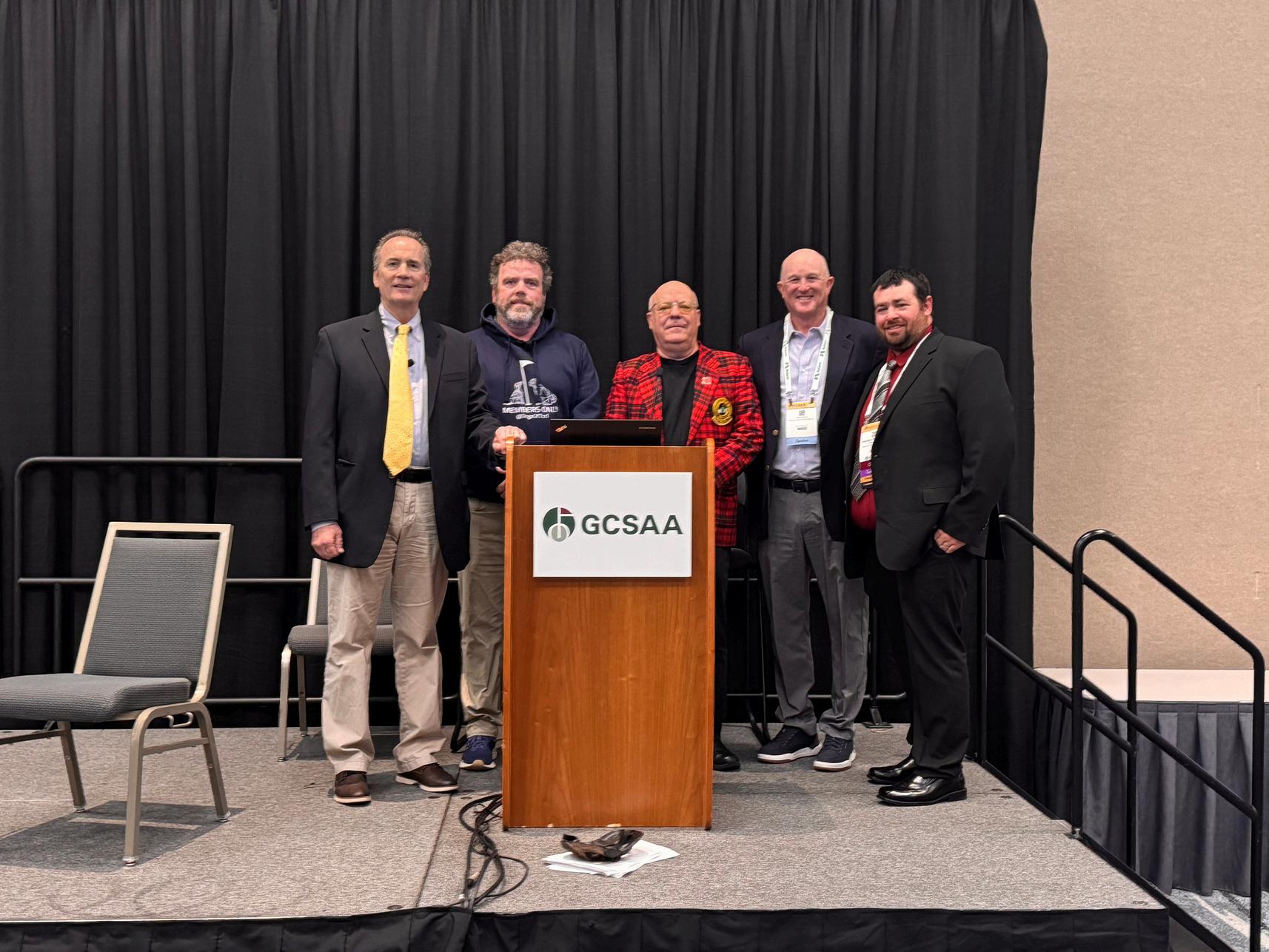
groups was George Renault, CGCS, from Burning Tree Club, Bethesda, Md , who served as GCSAA president in 1998. GCSAA has held a board seat with the Alliance since our beginning.
The relationship between the Alliance and GCSAA has continued with Chava McKeel, GCSAA director of government affairs, who has served on the Alliance board of directors since 2012. Golf course superintendents play a crucial role in ensuring facilities are, and remain, accessible to individuals who require additional access afforded them by law
GCSAA support contributes to the Alliance’s ability to deliver resources and education to the industry. This includes the GCSAA membership, along with the other member-based associations in golf including the NGCOA, PGA, LPGA and CMAA These organizations, as well as the ASGCA, GCBAA, NCA and others, are also involved on our board and facilitate the availability of several free resources, including: the National Alliance Education Hub (where GCSAA members can earn education credits for completing the Onboarding Training Series); a self-assessment process to help facility leadership evaluate preparedness for golfers with disabilities; the Golf Access and Inclusion Network; the Adaptive Golf Cars, Programs and Facilities Database; and Golf Inclusion Monthly magazine.
Contributions from GCSAA to accessible and inclusive golf were recently on display at the USGA’s Fourth Annual U S Adaptive Open at Woodmont Country Club in Rockville, Md. Ryan Severidt, CGCS, Woodmont CC’s director of grounds, the club’s staff and membership presented a venue that delivered a world-class golf
competition. The event will return to Woodmont CC next year, then in 2027 will head to Sunriver Resort in Sunriver, Ore.
The USGA has established an amazing event and was also involved in the establishment of the Alliance. We remain appreciative of the USGA’s support and guidance.
The high level of golf that is played at the Adaptive Open is a testament to the drive and determination these golfers have. To get to this level, they had to start somewhere to learn the game. That “somewhere” is where the Alliance, GCSAA and our supporters and partners live at any one of the thousands of golf facilities around the country that provide avenues to bring individuals with disabilities of all ages and demographics into the game.
Many golfers with disabilities may never aspire to play in competitive events However, all of these golfers, whatever their disability or impairments, share a common trait with all of us who love golf, which is, it’s just really nice to be out there and part of the action with family and friends. Being included has a tangible qualityof-life benefit.
GCSAA and its membership help make this possible Thank you
Dave Barton, PGA, is executive director of the National Alliance for Accessible Golf For more information on the Alliance, visit accessgolf org
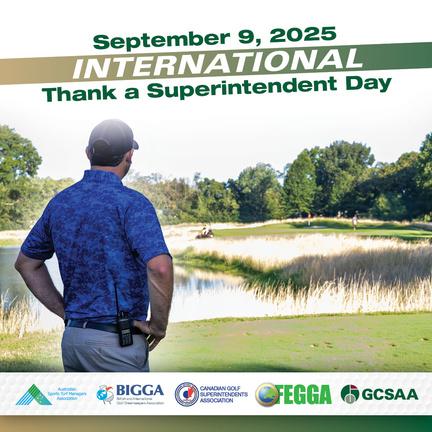

“GAIN is not simply a community networking platform, it is the top national resource and education center for the golf industry related to ADA compliance, education, and the game. Existing programs are growing and new ones are developing. But, can we say that golf facilities around the country are universally prepared? No … we can’t say that. ”
Dave Barton, PGA Alliance Executive Director
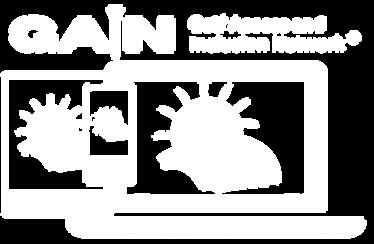
A networking platform and resource center for golfers, adaptive golf leaders, and anyone who believes golf is a game for everyone.
Why do many golf courses fail to promote their accessibility?
Is the adaptive golf community positioned for professional golf tournaments?
These are just a couple of the questions posted on GAIN where you have opportunities to share your opinions and engage in conversation with the community.
No politics, no AI posts, no useless videos draining your time and focus! GAIN is a place to truly network and communicate with an audience doing great things in the game of golf including those playing, coaching, or supporting the community
What would you like to know? Whose questions can you answer?
All are welcomed on GAIN and the community looks forward to your contributions on this free networking resource provided by the National Alliance for Accessible Golf
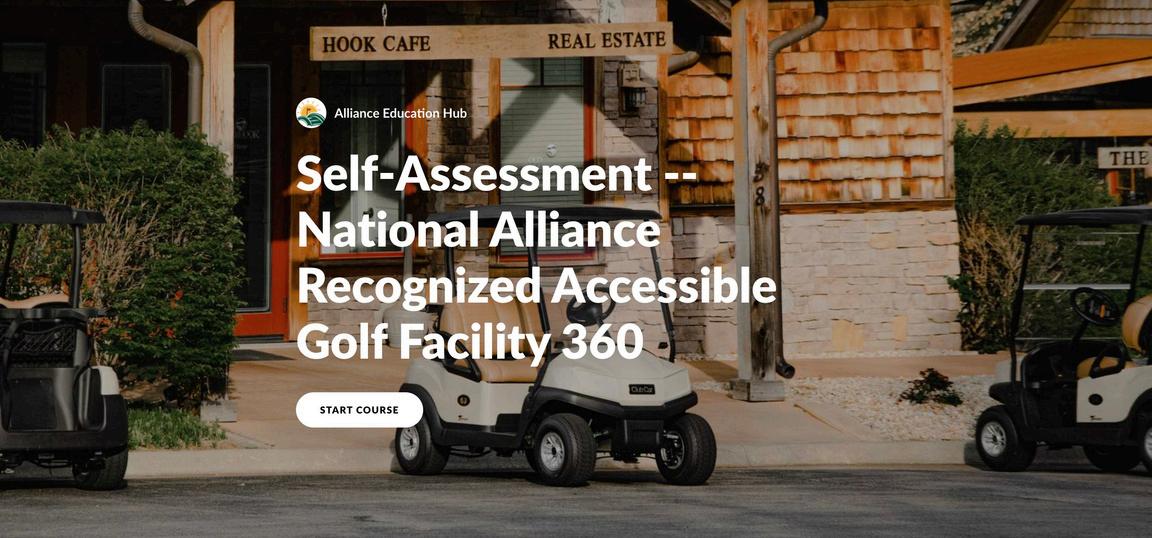
How do you know your golf course is accessible per the Americans with Disabilities Act? Simple … make some time to find out.
If your golf facility truly prides itself on welcoming golfers of all abilities and you have not yet conducted a selfassessment to confirm you are providing a barrier free environment, your surrounding community is waiting, or going somewhere else to play golf
Show your neighbors that you welcome everyone into the game of golf by accessing the Alliance Education Hub and completing a Self-Assessment and demonstrating your commitment to access and inclusion in the game of golf.
Is your course barrier free? Is your staff training to communicate and work with individuals with disabilities? Is your website ADA and WCAG compliant such that your customers with disabilities can understand what you offer? Do you have policies that are easy for customers to find that may need additional access or equipment to play the game?
Earn your credential as a Recognized Accessible Golf Facility through the National Alliance Education Hub.
Then you’ll know, and so will your future customers.
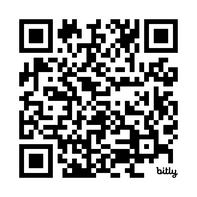
337
Training Hours Completed 242
The Alliance Education Hub is a FREE service available to anyone in the golf industry.
By Mindy Derr
As a young person, Mindy loved golf and wanted to help others After her father, Guy (pictured below), fell ill post-retirement, Mindy took action to support his health Guy was a proficient and avid golfer With her expertise in the nonprofit sector, Mindy began developing her new nonprofit. To honor her father, Mindy founded Fore Hope, one of the first golf therapy programs in the nation Fore Hope became the pathway for healing and hope
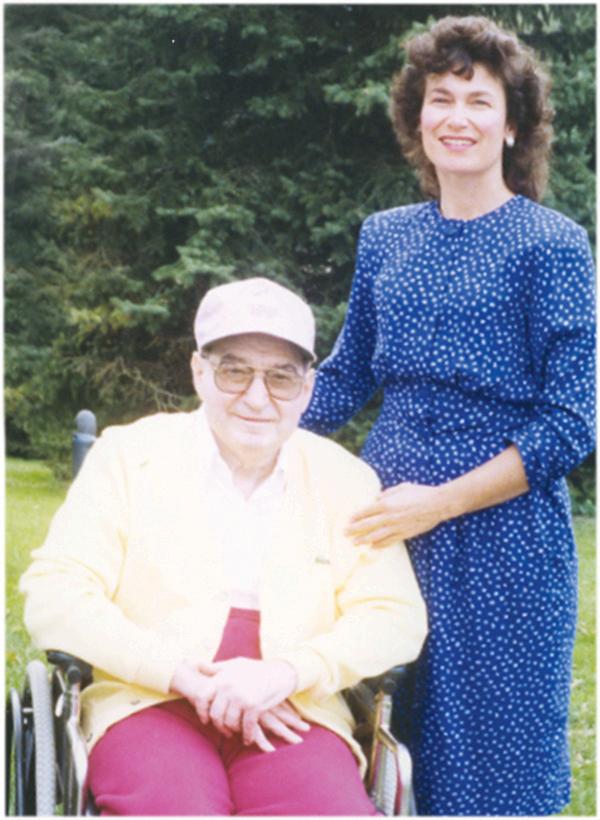
Fore Hope was established by Mindy on the northern shores of Lake Erie, (Ohio) in 1989 and relocated to Columbus, Ohio in 1991 Mindy built, executed, and grew this Fore Hope organization to be nationally known and to serve the initial participants in northern Ohio and then thousands over the years in Central Ohio and outlying areas. Individuals in adult day and care centers, inpatient and outpatient rehabilitation settings, hospitals, schools, support groups, as well as healthcare and golf communities, have benefitted from Fore Hope programs, ultimately improving quality of life and an option for a safe and fun recreational activity Fore Hope expanded its staff and volunteers and routinely visited facilities to promote services
The brand of Fore Hope grew.
This successful organization began with “the end in mind” mentality as it prepared for future financial sustainability to ensure ongoing program services and live in perpetuity Fore Hope staff and board members prioritized their focus on mission, relationship building, resource procurement, community, and service. Fore Hope has raised 6 million plus in revenue and gift in kind The OhioHealth Foundation began an endowment fund in 2023 for future program needs This new endowment is named, the Guy Derr and Mindy Derr Fore Hope Fund.
Fore Hope has been nationally recognized and supported in part by golfing legend Jack Nicklaus, his family, the PGA TOUR and TOUR wives, the Memorial Tournament, many donors and grantors over the years Fore Hope secured a major gift in 2010. This generous donation sustained Fore Hope’s efforts to move forward in becoming a stronger candidate for partnership with OhioHealth Healthcare system
Fore Hope’s niche utilizing golf as a validated tool to improve wellness, ultimately facilitated a successful absorption by OhioHealth, one of the top 5 health systems in America, in 2017, Columbus, Ohio. OhioHealth recognizes the Fore Hope program as a resource that aligns with their system’s wellness initiatives. Fore Hope is the first therapeutic golf program adopted by a major healthcare system.
Fore Hope program lives on and is thriving within the OhioHealth Neuroscience Center OhioHealth was introduced to this turnkey progress for golf therapy as Mindy brought forth her knowledge and experiences from building Fore Hope from the ground up. She developed the internal team for OhioHealth including a competent and talented PGA Teaching Professional. Participants in Fore Hope are referred by physicians and therapists to the Recreation Therapist at OhioHealth An intake process then takes place
Fore Hope continues year around. Fore Hope’s impact has been extraordinary. Since inception, Fore Hope has served over 10,000 individuals with illnesses and injuries, and influenced families, care partners, friends, donors, and volunteers
Outdoor golf sessions and course play continue by OhioHealth. Teaching sessions on Mondays and twice a week evening golf leagues are hosted at Safari Golf Club next to the Columbus Zoo Due to the popularity of Fore Hope, participants are rotated every other week for league play to meet the demand In the off season, late fall through April, programs are held indoors at Bo Jackson’s Elite Sports on Mondays and Wednesdays.
Fore Hope has demonstrated expertise in both employment opportunities and volunteer development Professional growth within Fore Hope was encouraged across multiple disciplines, including administration, fundraising, golf instruction, and both physical and recreational therapy.
An OhioHealth Fore Hope participant describes how vital the program has been for her health and wellness Mary Jean B stands by Fore Hope as she proclaims that this program has given back her life of activity, confidence, camaraderie, the joy of being alive, and able to do what she loves.
Mindy remains an advocate for those with neurological conditions through her new initiative, Wellness and Golf. She creates further awareness and education about the magical powers of golf and its healing potential. Her audience consists of golf management companies, healthcare associations, neurological associations, patients, and foundations She “walks the talk” living with MS and knows full well how illness can change one’s life
To learn more, please visit: MindyDerr.com OhioHealth com/ForeHope
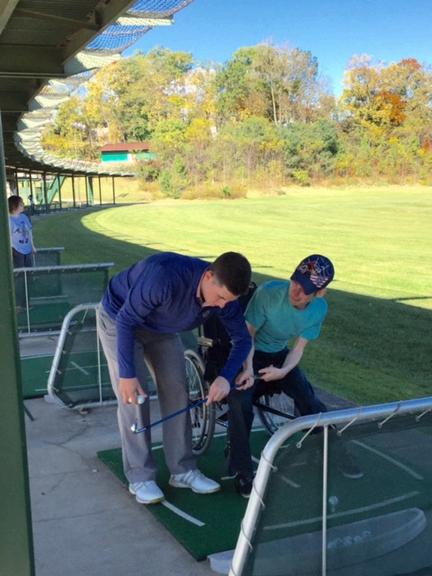
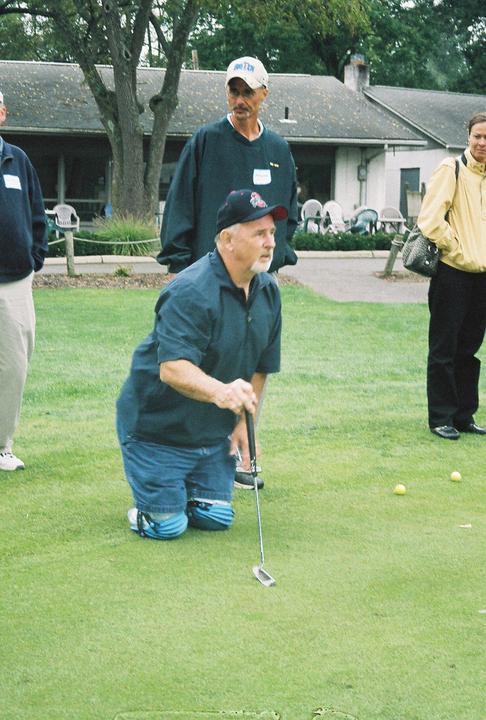
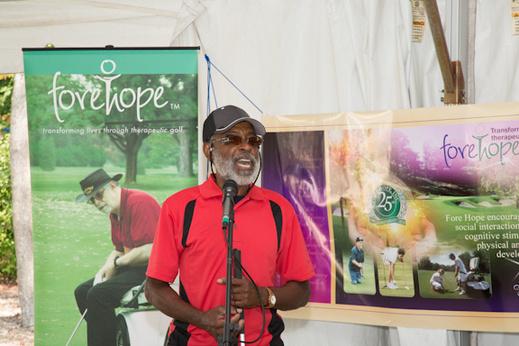
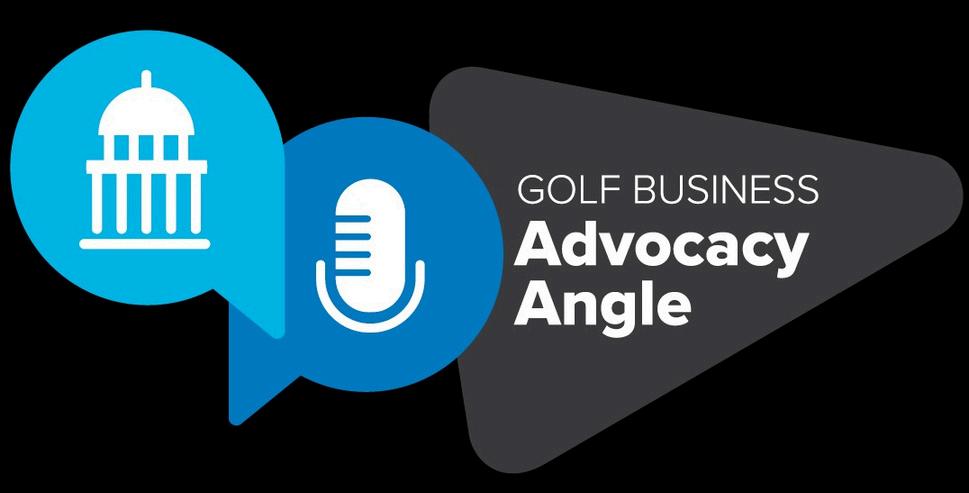

Alliance Executive Director, Dave Barton recently had the opportunity to sit down with NGCOA Senior Director of Advocacy Ronnie Miles and Golf Business Advocacy Angle host Michael Williams to talk golf.
If you are a golf facility owner and operator and not yet a member of the NGCOA, give them a call! It is one of the best decisions you can make for your business. Please visit ngcoa.org to learn more.
Michael and Ronnie lead off the show and dive into the current big issues that affect golf operations around the country, such as Audubon certifications, the One Big Beautiful Bill, the 2026 Appropriations Bill, H2B Visas, returning workers, 2017 tax incentives extended, independent contractors at golf facilities, tax relief for tipped employees and more.
Dave joins Michael and Ronnie at about the 11-minute mark to talk about the Americans with Disabilties Act (ADA), the game of golf, and how the Alliance serves as an education, advocacy and resource center for the golf industry.
Thank you to the NGCOA who have been Alliance supporters for many years, including Ronnie Miles’ participation as an Alliance Board Member. We hope you enjoy the discussion!

By Ben Shockley | wilx.com |
Published: Jul. 28, 2025
BATH TWP , Mich (WILX) - The 70th Michigan Adaptive Golf Championship was held at Hawk Hollow Golf Club in Bath Township over the weekend The tournament features golfers with a spectrum of physical challenges, and those golfers say the best part of the tournament is the camaraderie found among the participants
Bryan Biagioli is the president of the Michigan Amputee Golf Association, and a 25-year veteran of the Michigan Adaptive Golf Championship
“It’s an opportunity not only to play golf, but to be with your peers, ” Biagioli said. “it’s really become a family and we always look forward to seeing each other. It’s like a brotherhood, sisterhood, we love getting together The camaraderie is second to none ”
Brian Bemis, from the Lansing area, has won the event twice and finished fifth this time, but says the tournament is about much more than the final results
“We need golf Golf keeps us sane, ” Bemis said “Coming out here and finding understanding in finding
others like us that want to play and enjoy it and play at a high level ”
Haslett native Danny Wiseman finished in third place, but to Wiseman, the best part of the weekend is the opportunity to compete and connect with other golfers.
“I like to compete, ” Wiseman said. “You hear some great stories out here It’s hard to be in a bad mood playing with any of these guys And everybody is going through something, has been through something, whatever the case may be, and they’re out here palying golf and competing. It’s pretty uplifting, and I think that’s important. ”
“Whether you have cancer, or an accident, or something life-altering, doesn’t mean that life is over, that your athletic career is over, ” Bemis said “It’s just veered off course a little bit, and with groups like the Michigan [Amputee] Golf Association and others in the USGA have helped recognize us and help get us to another level and help promote us, and it’s been fantastic. ”


GAIN is your community ... a free networking forum to foster better access to adaptive golf experts across the country and resources to serve the community of golfers with disabilities and those that lead and support these efforts.
All are welcomed on GAIN ... those seeking information about adaptive golf, the ADA and more with those that can provide the answers.
ADA & Accessibility
Competition & Rules
Facilities, Programs, Adaptive Golf Cars
Calendar of Events
Open Forums

